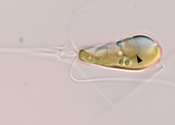A possible alternative to antibiotics
Scientists from the University of Bern have developed a novel substance for the treatment of severe bacterial infections without antibiotics, which would prevent the development of antibiotic resistance.

Scientists from the University of Bern have developed a novel substance for the treatment of severe bacterial infections without antibiotics, which would prevent the development of antibiotic resistance.
Biotechnology
Nov 4, 2014
9
4

Modern biology textbooks assert that only bacteria can take nitrogen from the atmosphere and convert it into a form that is usable for life. Plants that fix nitrogen, such as legumes, do so by harboring symbiotic bacteria ...
Cell & Microbiology
Apr 11, 2024
0
3719

New UMBC-led research in Frontiers in Microbiology suggests that viruses are using information from their environment to "decide" when to sit tight inside their hosts and when to multiply and burst out, killing the host cell. ...
Cell & Microbiology
Sep 23, 2022
1
603

A new analysis supports the hypothesis that viruses are living entities that share a long evolutionary history with cells, researchers report. The study offers the first reliable method for tracing viral evolution back to ...
Cell & Microbiology
Sep 25, 2015
35
4557

A fungal parasite that infects ants and manipulates their behavior to benefit the fungus' reproduction accomplishes this feat without infecting the ants' brains, according to a study led by Penn State researchers.
Plants & Animals
Nov 7, 2017
2
1535

A new approach has been developed to combat diseases caused by herpesvirus infections, including everything from cold sores to cancer.
Cell & Microbiology
Nov 1, 2016
0
1396

The emergence of a new variant of coronavirus has sparked renewed interest in the part of the virus known as the spike protein.
Cell & Microbiology
Dec 23, 2020
0
21

Scientists at the University of Cambridge, in collaboration with Justus-Liebig University, Germany, have uncovered how the genome of SARS-CoV-2—the coronavirus that causes COVID-19—uses genome origami to infect and replicate ...
Cell & Microbiology
Nov 5, 2020
0
619

A team of specialists in mathematical modeling from the RUDN University suggested a qualitative model of virus evolution and of the occurrence of new strains. The results of the study can make predicting virus behavior more ...
Mathematics
Sep 17, 2020
0
9

The COVID-19 virus holds some mysteries. Scientists remain in the dark on aspects of how it fuses and enters the host cell; how it assembles itself; and how it buds off the host cell.
Molecular & Computational biology
Feb 26, 2021
1
175
In biology, a host is an organism that harbors a virus or parasite, or a mutual or commensal symbiont, typically providing nourishment and shelter. In botany, a host plant is one that supplies food resources and substrate for certain insects or other fauna. Examples of such interactions include a cell being host to a virus, a legume plant hosting helpful nitrogen-fixing bacteria, and animals as hosts to parasitic worms, e.g. nematodes.
This text uses material from Wikipedia, licensed under CC BY-SA